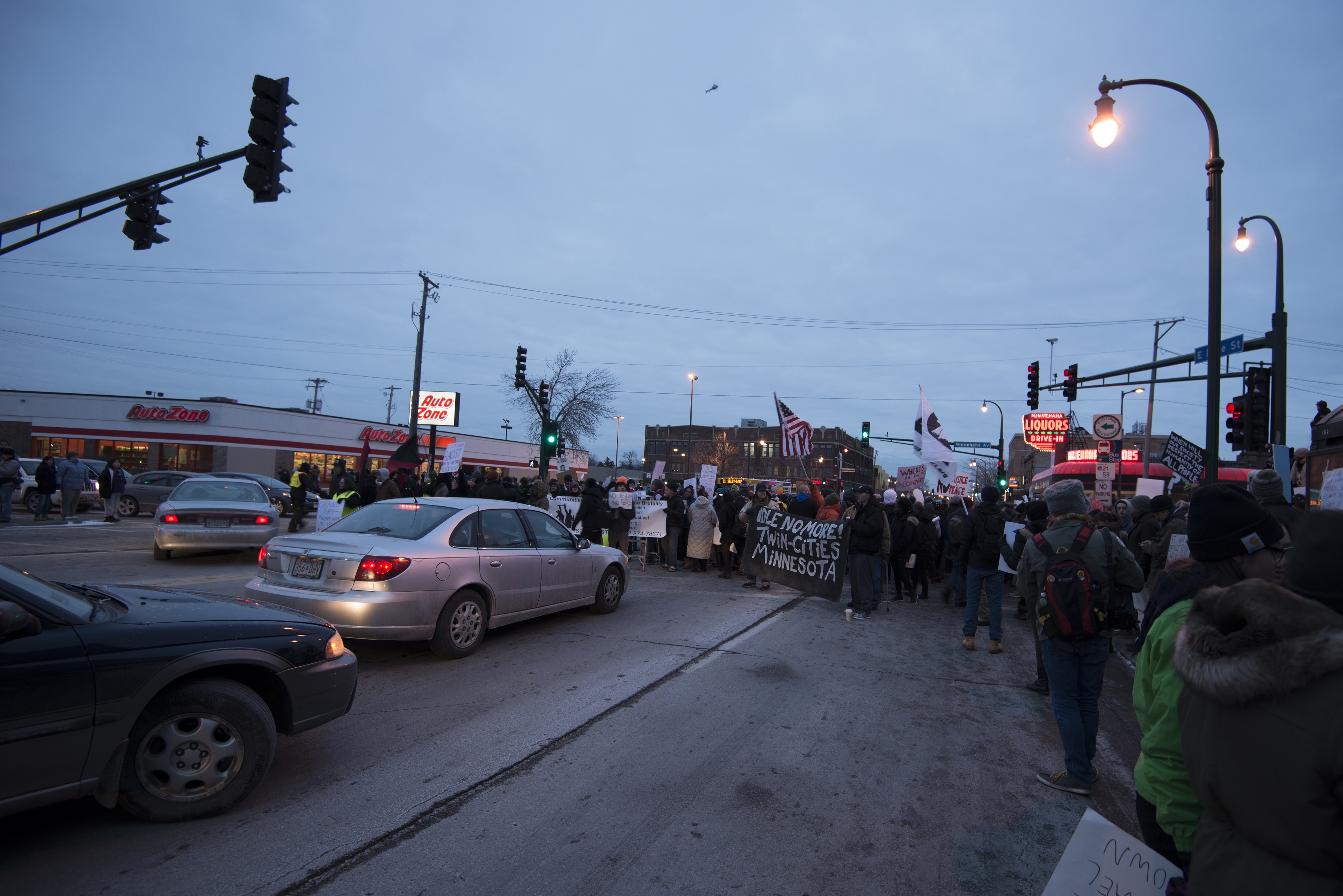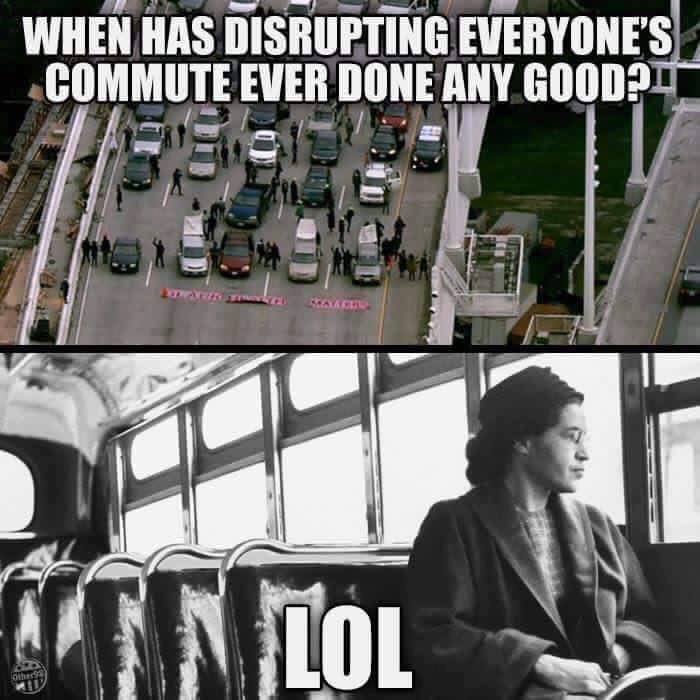Why do Protesters Block Roads?
by George West
21 September 2016

Whenever protesters choose to block a road familiar arguments surface. Won’t it alienate people? Why don’t they obstruct a police station, or parliament? Why make this a problem for everyday people? These arguments dominated comment threads after Black Lives Matter brought traffic to a halt near Heathrow airport in August, and they’re not meritless – people debate them every time a blockade is considered. Here are four reasons they decide to do it anyway:
1. To send a message.
Liberal ideology tends to understand the world as a mosaic of ideas; a series of battles between reason and human fallibility, ever marching towards progress and enlightenment. We’re told that bosses can be convinced to ditch zero hours contracts by persuasive moral argument, that European colonial powers outlawed slavery due to the altruistic actions of a few Great Men, and that the purpose of protest is to negotiate with an essentially reasonable authority.
In part blockades exist to disrupt this narrative, as one US Black Lives Matter organiser, who asked to remain anonymous, told me: “The thing about protesting is that it’s ritualistic in a liberal democracy. You’re seen as actually exercising your freedom of assembly, and so society thinks that while you’re critiquing the system, you’re also complimenting it: ‘look at those protesters, let’s see them do that in Iran or China’, etc.
“And so, to get people to really understand that we’re talking about an emergency – an emergency that seems banal to most in everyday life – we have to stop things from moving. It’s not just them being inconvenienced, it’s them being forced to confront the reality of police killings and mass incarceration.”
2. Direct action gets the goods.
The point of direct action isn’t just the mediation of public opinion, it’s to force change. In reality the slave trade in Europe was defeated by a series of slave revolts, alongside changing geopolitical and economic conditions. Closer to home a determined and militant picketing campaign cost Sports Direct owner Mike Ashley millions, eventually forcing him to abandon the zero hours model – far from the spontaneous moral awakenings cited by liberal commentators.
These examples – so different in time, location, and significance – are linked by a common historical truth: liberation has never been won by meekly appealing to the oppressors’ moral sympathies, always by militant direct action. As Frederick Douglas remarked on the 23rd anniversary of the abolition of British slavery in the West Indies – again won by the slaves themselves – “power concedes nothing without a demand, it never did and it never will.”
This is the logic of protest captured by the blockade. Block a road and you bring the smooth running of capitalism to a grinding halt. Late capitalist economies are premised on a continuity of work and consumption; roads are vessels which transport a ceaseless flow of people to offices, shopping centres, airports. A blockade acts like a blood clot: do it effectively enough and the state has to respond.
3. It’s worked before.
Beyond direct action as an abstract category, blockades specifically tap into long legacy. Joshua Clover, professor of political economy at the University of California, Davis, is the author of Riot. Strike. Riot: the New Era of Uprisings, which traces the forms that protest has taken over several hundred years. There are “literally thousands” of examples where blockades have been effective in achieving political ends, he says. “This is in fact the most common form of riot in England during the 17th and 18th centuries … Examples persist to this day. But they are no longer singular phenomena, existing independent of broader conflicts.”
This connected nature of conflict can be seen clearly in the US civil rights struggles of the 20th century. In 1965 thousands of people blocked 54 miles of highway over five days, not once but three times, as they marched from the town of Selma to the Alabama state capital Montgomery, eventually forcing president Lyndon Johnson to sign the 1965 Voting Rights Act, which outlawed voter literacy tests and other practices designed to disenfranchise people of colour. These actions were part of a long campaign which included boycotts, sit-ins, and other tactics in addition to blockades, much like Black Lives Matter today.

4. It’s already everyone’s problem.
Comment thread denizens complaining about the inconvenience caused by blockades are missing another universal truth of capitalism: an injury to one is an injury to all. Solidarity exists on the basis of shared interest: an assault at one workplace – such as the recent payment restructuring attempted by Deliveroo bosses, and successfully resisted by drivers – has the potential to drive down pay and conditions across the board by removing the job from the list of better options available to workers elsewhere, leaving them unable to jump ship if their own conditions come under threat.
Keeanga Yamahtta-Taylor, assistant professor of African American studies at Princeton, argues that racism plays a similar role. Originally used to justify slavery and colonialism, it was later adapted to capitalism’s changing conditions: “When slavery ended, racism did not end with it, but became a tool by which the wealthy could divide poor Blacks from poor whites” which “harms all workers, including white workers, by driving down wages and living standards for the entire working class.”
The effects of this strategy radiate beyond the workplace. Racism’s erosion of working class power leaves us less able to fight everything from NHS privatisation to climate change and benefit cuts. The scapegoating of immigrants obscures the fact that unemployment and poverty are structurally enforced by capitalism, often explicitly so, as with the Bank of England’s diktat that the UK keep a minimum of 5% of the workforce unemployed to stave off inflation. Similarly the racist exceptionalisation of the 2011 London rioters as criminals, ‘pure and simple‘ was designed to reinforce a worldview in which civil disorder – even when committed en masse by those excluded from the wage, and thus the traditional strike – can only be the result of individual agency, of moral defectiveness, rather than a reaction to the grim social reality of late capitalism.
In the struggle against all this, being stuck in traffic for a few hours seems a small price to pay.